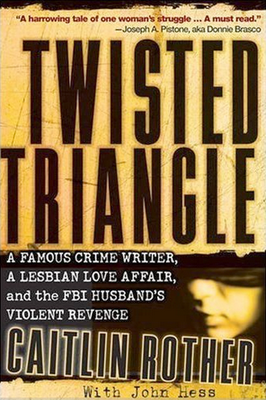Twisted Triangle: A Famous Crime Writer, a Lesbian Love Affair, and the FBI Husband’s Violent Revenge

“Stranger than fiction” is the most accurate way to describe the premise for this book about married FBI agents. The wife has a lesbian affair with a crime novel author, and the husband kidnaps and later tries to kill his wife. And yet, it’s a true story! Having never heard of this case before, I could not put the book down and found myself eager to get to the end to see how it all turned out.
The book tells the complex story of an abusive relationship between Gene and Margo Bennett, as well as their personal, professional, and legal troubles. Evidence of Gene’s emotional abuse towards his wife is presented early in the book, and starts to draw the outline of the picture that’s yet to come. He carries out a scam to get money from the F.B.I., and is prosecuted when Margo decides to divorce him and reports the incident. A power struggle starts as he seeks revenge for her betrayal and her affair with Patricia Cornwell, a famous author. He kidnaps her to make her lie in court and clear his name, but is still convicted. When he gets out of jail, he carries out an elaborate and bizarre plan to frame her for murder and attempts to kill her. Ultimately, Gene is found guilty on several charges, including attempted murder, and sentenced to twenty-three years and ten years of probation. The book wraps up by describing the aftermath of the trial and its effect on Margo and her two daughters.
One of the problems with the book is that it’s told primarily through the perspective of Margo, but this is because the author attempted to contact Gene, but he did not agree to participate. The writing itself is awkward at times, which doesn’t help the fact that the story unfolds itself is hard to keep up with. There are so many names and places to keep track of, yet they are sometimes mentioned without a reminder about how we should know who or what the author is referring to.
These problems, however, are minor when compared to the important themes raised in the book. Because Margo was raised to be ashamed of homosexuality and bisexuality, she viewed her relationships with women as innocent experimentation. She even viewed her affair with Patricia Cornwell as separate from any pattern that would make her label herself as a lesbian. The homophobia and bias against homosexuality in the Virginia justice system is also mentioned several times throughout the book.
Gene’s abuse towards Margo, along with her ignorance about what was happening in her marriage, is the perfect example of how abuse works. It seems that no matter how severe the abuse and torment, the blame still falls on the victim. In fact, this situation shows that the more severe the abuse, the more blame a victim might receive. Why didn’t she know better? She was an FBI agent after all... How could she not see the signs in her own relationship? Why did she let it go that far? All of these are questions echoed throughout the book by her peers, and all demonstrate why these stories need to be told. It should go without saying that there is great motivation to disconnect one’s own relationship from the scenarios and “what ifs” that a person hears about, and yet these questions often come up.
At its core, this book is about abuse and sexual repression—two themes that could certainly use more attention and discussion, especially when they reflect a true story and not a work of fiction.